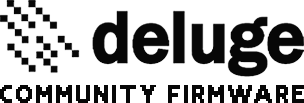CPU and Memory
Processing power and CPU management
Deluge does not enforce firm limits on how many tracks or voices may sound at once thus allowing the user as many as they wish. The ultimate limitation will inevitably be based on Deluge’s CPU loading especially from concurrent voices or effects. Under conditions of high CPU loading, Deluge will switch off a synth or sample voice to lower its load. Deluge will attempt to do this in the most subtle way possible, preferring to switch off voices which are “releasing”, and those which have been sounding for the longest time.
Unaffected sample voices are very light on the CPU. This has been tested with a measure of up to 110 sounding at once. For synth voices, the most simple ones are light enough to allow around 64 to play.
The Deluge’s analog-modelled oscillator types and drive filter consume a little more CPU than the other types, but not enormously more.
Considerations for CPU power:
- Analog-simulated delay, time stretching, and pitch shifting (where pitch and time are treated independently - including live audio input) are the highest CPU users.
- All other effects and synth features, though lighter, will add to the CPU’s load as well.
- Synths with unison switched on will multiply the amount of processing power that that synth consumes.
- Arpeggiation can generate a lot of CPU-eating voices very rapidly, which can add up if polyphony is on (is set to POLY) and if the release time is long. Try changing these parameters if you notice voices cutting out on your song.
- There is a slight CPU overhead for each sound present in the Deluge’s currently loaded song - even if it is not sounding at a given moment. This may begin to affect CPU performance if you have more than 50 to 100 sounds loaded. For this reason, you may wish to refrain from importing large folders of samples as kits where these are not in-fact used. Multi-sampled instruments, count as just one sound regardless of how many separate samples they contain.
- Voice priority can be manually set for a sound, to tell the Deluge which voices to consider (or not) dropping first - see sound editor .
- .aiff and 32-bit floating point audio files have a slight processing overhead, so are less recommended in CPU-heavy projects.
- See sample interpolation / pitch for some additional notes on CPU usage.
Sample Interpolation / Pitch
Whether or not actual “pitch shifting”, the process of treating pitch and speed independently, is applied, another process called interpolation is needed anytime a sample needs to be played back at a different pitch, or if its sample rate is different to the Deluge’s native 44.1kHz.
Since firmware V2.1, Deluge utilises 16-point windowed-sinc interpolation for high-quality sample pitch adjustment with minimal aliasing. If you prefer the more “bitcrushed” sound of linear interpolation, which was used prior to V2.1, see the INTErpolation setting in the sound editor.
Songs and presets created with pre-V2.1 firmware which include sample pitch adjustment will continue to default to linear interpolation, to keep your older projects sounding the same.
The 16-point windowed-sinc interpolation uses a little more CPU power than the lower-quality linear interpolation, but not very much more, thanks to the hardware acceleration features of the Deluge’s CPU. If the Deluge’s CPU becomes overloaded, it may revert to using linear interpolation in some cases. It is not recommended that you manually switch to linear interpolation purely for the purpose of saving CPU power - it won’t have this effect in all cases.
Sample and RAM management
The Deluge streams audio samples directly off the SD card, meaning there is no practical limit on the amount of sample content that may be used per song, and the user does not have to wait for all sample data to be read when loading a song.
You may eject the SD card at any time, the only adverse effect being that if the Deluge is playing any sample, it may stop, and samples may not play correctly until the card is reinserted.
The Deluge has 64MB of working RAM, which is mostly available to hold the currently loaded song’s synths, parameters, and sequenced notes. It’s unlikely that the 64MB limit would ever be reached - this would be enough to hold over 2 million notes.
There may be cases, when switching songs, that if both songs contain a lot of samples (i.e. near to the Deluge’s 64MB RAM limit), where the newly loaded song may fail to play some sounds for the first couple of seconds. However, the Deluge does everything it can to avoid such a case, by first discarding any not-currently-playing samples in the old song, and if necessary delay the loading of any not-currently-playing samples in the new song until the old song has been discarded completely.
Synth voices vs Samples
The Deluge can handle much fewer samples than synth voices.
Here are some approximate numbers:
- 100 voices for FM and Subtractive based synths without filters
- 60 voices for normal synths
- 30 voices for DX7 synths
- 30 voices for wavetable / very short sample based synths
- 24 mono (12 stereo) samples streaming at once with a good SD card
- With regard to samples, the Deluge is limited by how many samples can be read from the SD card at once. For suggestions on the types of SD card’s to use, please refer to the SD Card page.
There are also other factors that can lead to reduce synth voice and sample performance:
- Heavy automation use
- Heavy modulation use
- Heavy filter use
- Long sustains
- High polyphony, with lots of note on’s triggering at the same time
- Higher bitrate samples (e.g. 32 bit instead of 16 bit)
- Stereo samples (instead of Mono samples)

